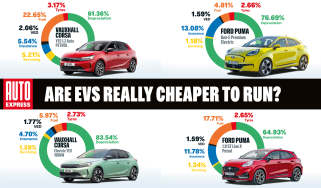What is negative equity in car finance?
Negative equity isn’t usually associated with car finance but it can happen. Here’s everything you need to know…

You’ll probably have heard of negative equity in relation to houses, where the value of a property is less than the money still owed against it on a mortgage. It’s an unpleasant situation, and one that can be replicated – albeit usually without such severe repercussions - in the world of cars.
Below we’ve explained what negative equity means when it comes to car finance, why it might happen, what can happen when you sell a financed car that’s in negative equity, and how you might avoid it.
What is negative equity in car finance?
Much like houses, negative equity in car finance comes about when the amount you still owe as part of a finance deal is more than the value of the car you’ll have at the end of it – essentially, the car has depreciated faster than the rate at which you’re paying it off. Alternatively, negative equity can also be a problem if you get into an accident, and the amount paid out by the insurance company is less than what you still owe to the finance company.
While it’s something to be concerned by when paying off a mortgage, it’s typically less of an issue with cars – partly because the sums involved tend to be lower, but also because the most common car finance methods, Hire Purchase and Personal Contract Purchase, tend to be geared up to avoid it – and when it comes to insurance, Guaranteed Asset Protection insurance or ‘GAP’ insurance also accounts for negative equity.
Why is my car in negative equity?
Negative equity essentially happens because cars depreciate. As this depreciation happens at different rates, and can be influenced by certain factors such as a car’s mileage, condition, or market forces, there may be a point at which the car is worth less than the money required to pay off the finance.
Hire purchase and negative equity
In most cases, buyers shouldn’t be too concerned about negative equity with Hire Purchase or HP, because your monthly payments are precisely calculated to pay off the car by the time your HP agreement is up. This means you own the car at the end of the agreement whatever happens, and even if the car has depreciated severely, that’s only really a problem if you want to immediately sell it. There may well be a point at which the car is worth less than you still have to pay off, but it’s not like someone will be offering you market value for the car half way through your HP agreement.
If you want to get out of the HP agreement though and you’ve not yet paid 50 per cent of the car’s finance (the point at which the Consumer Credit Act says you can leave an HP agreement early without penalty), you’ll need to make up the shortfall to 50 per cent. This isn’t technically negative equity, but does mean paying over the odds for the period in which you’ve ‘owned’ the car.
Personal contract purchase and negative equity
Buyers are typically protected from negative equity in Personal Contract Purchase car finance, or PCP, through a guaranteed minimum future value, or GMFV. As the term implies a GMFV means the PCP deal explicitly states what a car will be worth at the end of the finance period, essentially based on a car’s predicted depreciation (itself partly a function of the mileage limits typically imposed on PCP deals).
In other words, by the time you’ve completed the monthly payments, you shouldn’t be in negative equity, because the GMFV means the car is valued at exactly what the finance company said it would be. You can then choose to pay this sum as the balloon payment and drive away, the car now fully yours, or you can hand it back to the finance company, with no worries about negative equity. If the car does happen to be worth less, it’s basically the finance company’s problem, not yours.
Selling a financed car with negative equity
This is where you’re most likely to experience negative equity with a car on finance, as if you sell the car while you’re still paying it off, there’s a chance the money you get for the car may be worth less than what you still owe on it.
That said, you’ll have to check with the finance company before selling the car, as in most cases they’ll own the car until you’ve paid it off – it’s illegal to sell a car with outstanding finance. You may be able to get out of the contract early, though naturally you’ll have to settle the remainder of what you owe, and that’s when you may find yourself with negative equity problems.
How to avoid negative equity
The simplest way to avoid negative equity is to avoid exiting your finance contract early. While you’re in the contract, you’ll largely be protected from negative equity because the finance terms will be written in such a way that the burden of a car’s depreciation is on the finance company, not the individual. A guaranteed minimum future value means you won’t have to worry about negative equity on a PCP, while GAP insurance is good protection should you get into an accident in a car you’re still paying off.
Frequently Asked Questions
This is thankfully quite rare, but essentially the total of your outstanding car finance payments will be larger than the value of the car if you came to sell it. It’s only really likely to be a problem if you need to exit your finance contract early.
Did you know you can sell your car with Auto Express? Get the highest bid from our network of over 5,500 dealers and we'll do the rest. Click here to try Auto Express Sell My Car now...









